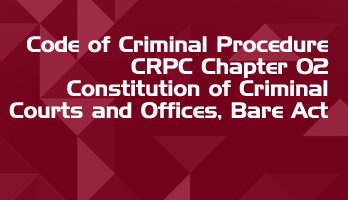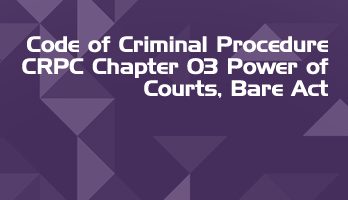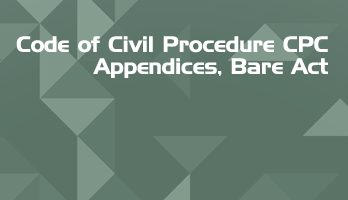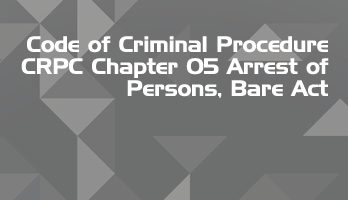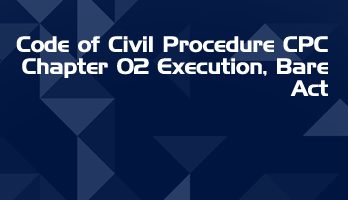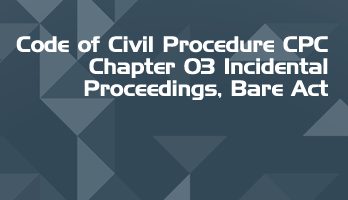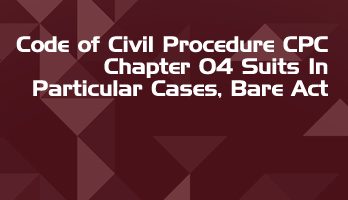A 'Bare act' is the actual legislation passed by the Parliament of India. Generally, an act sets out the high level legal and policy principles applicable to the subject matter of the law.
Most acts are accompanied by 'subsidiary legislation' such as rules, regulations, notifications and orders; which address the actual implementation detail of the act.
Free Full Course Available on LawMint's YouTube Channel
How to Land Your Dream LLB Internship in a Top Law Firm
- Part 1 - Introduction
- Part 2 - Internship Planning
- Part 3 - Internship Research
- Part 4 - Building Your Profile
- Part 5 - The Email
- Part 6 - The Resume
- Part 7 - The Cover Letter
- Part 8 - The Interview
- Part 9 - Self Development
Practical and comprehensive course, with real examples and step-by-step analysis of the complete internship application process. Check out LawMint's YouTube channel now!
Code of Criminal Procedure, 1973
Chapter 14 – Conditions Requisite For Initiation Of Proceedings
Section 190 – Cognizance of offences by Magistrates
- Subject to the provisions of this Chapter, any Magistrate of the first class, and any Magistrate of the second class specially empowered in this behalf under Sub – Section (2), may take cognizance of any offence –
- upon receiving a complaint of facts which constitute such offence;
- upon a police report of such facts;
- upon information received from any person other than a police officer, or upon his own knowledge, that such offence has been committed.
- The Chief Judicial Magistrate may empower any Magistrate of the second class to take cognizance under Sub – Section (1) of such offences as are within his competence to inquire into or try.
Section 191 – Transfer on application of the accused
When a Magistrate takes cognizance of an offence under clause c. of Sub – Section (1) of section 190, the accused shall, before any evidence is taken, be informed that he is entitled to have the case inquired into or tried by another Magistrate, and if the accused or any of the accused, if there be more than one, objects to further proceedings before the Magistrate taking cognizance, the case shall be transferred to such other Magistrate as may be specified by the Chief Judicial Magistrate in this behalf.
Section 192 – Making over of cases to Magistrates
- Any Chief Judicial Magistrate may, after taking cognizance of an offence, make over the case for inquiry or trial to any competent Magistrate subordinate to him.
- Any Magistrate of the first class empowered in this behalf by the Chief Judicial Magistrate may, after taking cognizance of an offence, make over the case for inquiry or trial to such other competent Magistrate as the Chief Judicial Magistrate may, by general or special order, specify, and thereupon such Magistrate may hold the inquiry or trial.
Section 193 – Cognizance of offences by Courts of Session
Except as otherwise expressly provided by this Code or by any other law for the time being in force, no Court of Session shall take cognizance of any offence as a Court of original jurisdiction unless the case has been committed to it by a Magistrate under this Code.
Section 194 – Additional and Assistant Sessions Judges to try cases made over to them
An Additional Sessions Judge or Assistant Sessions Judge shall try such cases as the Sessions Judge of the division may, by general or special order, make over to him for trial or as the High Court may, by special order, direct him to try.
- No Court shall take cognizance –
- (i) of any offence punishable under sections 172 to 188 (both inclusive) of the Indian Penal Code (45 of 1860), or (ii) of any abetment of, attempt to commit, such offence, or (iii) of any criminal conspiracy to commit, such offence, Except on the complaint in writing of the public servant concerned or of some other public servant to whom he is administratively subordinate;
- (i) of any offence punishable under any of the following section of the Indian Penal Code (45 of 1860), namely, sections 193 to 196 (both inclusive), 199, 200, 205 to 211 (both inclusive) and 228, when such offence is alleged to have been committed in, or in relation to, any proceeding in any Court, or (ii) of any offence described in section 463, or punishable under section 471, section 475 or section 476, of the said Code, when such offence is alleged to have been committed in respect of a document produced or given in evidence in a proceeding in any Court, or (iii) of any criminal conspiracy to commit, or attempt to commit, or the abetment of, any offence specified in sub – clause (i) or sub – clause (ii), except on the complaint in writing of that Court or by such officer of the Court as that Court may authorise in writing in this behalf, or of some other Court to which that Court is subordinate.
- Where a complaint has been made by a public servant under clause (a) of Sub – Section (1) any authority to which he is administratively subordinate may order the withdrawal of the complaint and send a copy of such order to the Court; and upon its receipt by the Court, no further proceedings shall be taken on the complaint: Provided that no such withdrawal shall be ordered if the trial in the Court of first instance has been concluded.
- In clause (b) of Sub – Section (1), the term “Court” means a Civil, Revenue or Criminal Court, and includes a tribunal constituted by or under a Central, provincial or State Act if declared by that Act to be a Court for the purposes of this section.
- For the purposes of clause (b) of Sub – Section (1), a Court shall be deemed to be subordinate to the Court to which appeals ordinarily lie from appealable decrees or sentences of such former Court, or in the case of a civil Court from whose decrees no appeal ordinarily lies, to the principal Court having ordinary original civil jurisdiction within whose local jurisdiction such Civil Court is situate: Provided that – a. where appeals lie to more than one Court, the Appellate Court of inferior jurisdiction shall be the Court to which such Court shall be deemed to be subordinate; b. where appeals lie to a civil and also to a Revenue Court, such Court shall be deemed to be subordinate to the civil or Revenue Court according to the nature of the case or proceeding in connection with which the offence is alleged to have been committed.
Section 195A – Procedure for witnesses in case of threatening, etc.
A witness or any other person may file a complaint in relation to an offence under section 195A of the Indian Penal Code.
Section 196 – Prosecution for offences against the State and for criminal conspiracy to commit such offence
- No Court shall take cognizance of –
- any offence punishable under Chapter VI or under section 153A, section 295A or Sub – Section (1) of section 505 of the Indian Penal Code (45 of 1860), or
- a criminal conspiracy to commit such offence, or
- any such abetment, as is described in section 108A of the Indian Penal Code (45 of 1860), except with the previous sanction of the Central Government or of the State Government. 1A. No Court shall take cognizance of – (a) any offence punishable under section 153B or Sub – Section (2) or Sub – Section (3) of section 505 of the Indian Penal Code (45 of 1860), or (b) a criminal conspiracy to commit such offence, Except with the previous sanction of the Central Government or of the State Government or of the District Magistrate.
- No Court shall take cognizance of the offence of any criminal conspiracy punishable under section 120B of the Indian Penal Code (45 of 1860), other than a criminal conspiracy to commit an offence punishable with death, imprisonment for life or rigorous imprisonment for a term of two years or upwards, unless the State Government or the District Magistrate has consented in writing to the initiation of the proceeding: Provided that where the criminal conspiracy is one to which the provisions of section 195 apply, no such consent shall be necessary.
- The Central Government or the State Government may, before according sanction under Sub – Section (1) or Sub – Section (1A) and the District Magistrate may, before according sanction under Sub – Section (1A) and the State Government or the District Magistrate may, before giving consent under Sub – Section (2), order a preliminary investigation by a police officer not being below the rank of Inspector, in which case such police officer shall have the powers referred to in Sub – Section (3) of section 155.
Section 197 – Prosecution of Judges and public servants
- When any person who is or was a Judge or Magistrate or a public servant not removable from his office save by or with the sanction of the Government is accused of any offence alleged to have been committed by him while acting or purporting to act in the discharge of his official duty, no Court shall take cognizance of such offence except with the previous sanction –
- in the case of a person who is employed or, as the case may be, was at the time of commission of the alleged offence employed, in connection with the affairs of the Union, of the Central Government;
- in the case of a person who is employed or, as the case may be, was at the lime of commission of the alleged offence employed, in connection with the affairs of a State, of the State Government: Provided that where the alleged offence was committed by a person referred to in clause (b) during the period while a Proclamation issued under clause (1) of Article 356 of the Constitution was in force in a State, clause (b) will apply as if for the expression “State Government” occurring therein, the expression “Central Government” were substituted. Explanation – For the removal of doubts it is hereby declared that no sanction shall be required in case of a public servant accused of any offence alleged to have been committed under section 166A, section 166B, section 354, section 354A, section 354B, section 354C, section 354D, section 370, section 375, section 376A, section 376AB, section 376C, section 376D, section 376DA, section 376DB or section 509 of the Indian Penal Code.
- No Court shall take cognizance of any offence alleged to have been committed by any member of the Armed Forces of the Union whole acting or purporting to act in the discharge of his official duty, except with the previous sanction of the Central Government.
- The State Government may, by notification, direct that the provisions of Sub – Section (2) shall apply to such class or category of the members of the Forces charged with the maintenance of public order as may be specified therein, wherever they may be serving, and thereupon the provisions of that Sub – Section will apply as if for the expression “Central Government” occurring therein, the expression “State Government” were substituted. 3A. Notwithstanding anything contained in Sub – Section (3), no Court shall take cognizance of any offence, alleged to have been committed by any member of the Forces charged with the maintenance of public order in a State while acting or purporting to act in the discharge of his official duty during the period while a Proclamation issued under clause (1) of article 356 of the Constitution was in force therein, except with the previous sanction of the Central Government. 3B. Notwithstanding anything to the contrary contained in this Code or any other law, it is hereby declared that any sanction accorded by the State Government or any cognizance taken by a Court upon such sanction, during the period commencing on the 20th day of August, 1991 and ending with the date immediately preceding the date on which the Code of Criminal Procedure (Amendment) Act, 1991, receives the assent of the President, with respect to an offence alleged to have been committed during the period while a Proclamation issued under clause (1) of article 356 of the Constitution was in force in the State, shall be invalid and it shall be competent for the Central Government in such matter to accord sanction and for the Court to take cognizance thereon.
- The Central Government or the State Government, as the case may be, may determine the person by whom, the manner in which, and the offence or offences for which, the prosecution of such Judge, Magistrate or public servant is to be conducted, and may specify the Court before which the trial is to be held.
1 Criminal Law (Amendment) Act, 2013
2 Criminal Law (Amendment) Act, 2018
Section 198 – Prosecution for offences against marriage
- No Court shall take cognizance of an offence punishable under Chapter XX of the Indian Penal Code (45 of 1860) except upon a complaint made by some person aggrieved by the offence: Provided that –
- where such person is under the age of eighteen years, or is an idiot or a lunatic, or is from sickness or infirmity unable to make a complaint, or is a woman who, according to the local customs and manners, ought not to be compelled to appear in public, some other person may, with the leave of the Court, make a complaint on his or her behalf;
- where such person is the husband and he is serving in any of the Armed Forces of the Union under conditions which are certified by his Commanding Officer as precluding him from obtaining leave of absence to enable him to make a complaint in person, some other person authorised by the husband in accordance with the provisions of Sub – Section (4) may make a complaint on his behalf;
- where the person aggrieved by an offence punishable under section 494 or section 495 of the Indian Penal Code (45 of 1860) is the wife, complaint may be made on her behalf by her father, mother, brother, sister, son or daughter or by her father’s or mother’s, brother or sister, with the leave of the Court, by any other person related to her by blood, marriage or adoption.
- For the purpose of Sub – Section (1), no person other than the husband of the woman shall be deemed to be aggrieved by any offence punishable under section 497 or section 498 of the said Code: Provided that in the absence of the husband, some person who had care of the woman on his behalf at the time when such offence was committed may, with the leave of the Court, make a complaint on his behalf.
- When in any case falling under clause (a) of the proviso to Sub – Section (1), the complaint is sought to be made on behalf of a person under the age of eighteen years or of a lunatic by a person who has not been appointed or declared by a competent authority to be the guardian of the person of the minor or lunatic, and the Court is satisfied that there is a guardian so appointed or declared, the Court shall, before granting the application for leave, cause notice to be given to such guardian and give him a reasonable opportunity of being heard.
- The authorisation referred to in clause (b) of the proviso to Sub – Section (1), shall be in writing, shall be signed or otherwise attested by the husband, shall contain a statement to the effect that he has been informed of the allegations upon which the complaint is to be founded, shall be countersigned by his Commanding Officer, and shall be accompanied by a certificate signed by that Officer to the effect that leave of absence for the purpose of making a complaint in person cannot for the time being be granted to the husband.
- Any document purporting to be such an authorisation and complying with the provisions of Sub – Section (4), and any document purporting to be a certificate required by that Sub – Section shall, unless the contrary is proved, be presumed to be genuine and shall be received in evidence.
- No Court shall take cognizance of an offence under section 376 of the Indian Penal Code (45 of 1860), where such offence consists of sexual inter – course by a man with his own wife, the wife being under eighteen years of age, if more than one year has elapsed from the date of the commission of the offence.
- The provisions of this section apply to the abetment of, or attempt to commit, an offence as they apply to the offence.
Section 198A – Prosecution of offences under section 498A of the Indian Penal Code
No Court shall take cognizance of an offence punishable under section 498A of the Indian Penal Code (45 of 1860) except upon a police report of facts which constitute such offence or upon a complaint made by the person aggrieved by the offence or by her father, mother, brother, sister or by her father’s or mother’s brother or sister or, with the leave of the Court, by any other person related to her by blood, marriage or adoption.
Section 198B – Cognizance of offence
No Court shall take cognizance of an offence punishable under section 376B of the Indian Penal Code where the persons are in a marital relationship, except upon prima facie satisfaction of the facts which constitute the offence upon a complaint having been filed or made by the wife against the husband.
1 Criminal Law (Amendment) Act, 2013
Section 199 – Prosecution for defamation
- No Court shall take cognizance of an offence punishable under Chapter XXI of the Indian Penal Code (45 of 1860) except upon a complaint made by some person aggrieved by the offence: Provided that where such person is under the age of eighteen years, or is an idiot or a lunatic, or is from sickness or infirmity unable to make a complaint, or is a woman who, according to the local customs and manners, ought not to be compelled to appear in public, some other person may, with the leave of the Court, make a complaint on his or her behalf.
- Notwithstanding anything contained in this Code, when any offence falling under Chapter XXI of the Indian Penal Code (45 of 1860) is alleged to have been committed against a person who, at the time of such commission, is the President of India, the Vice – President of India, the Government of a State, the Administrator of a Union territory or a Minister of the Union or of a State or of a Union territory, or any other public servant employed in connection with the affairs of the Union or of a State in respect of his conduct in the discharge of his public functions a Court of Session may take cognizance of such offence, without the case being committed to it, upon a complaint in writing made by the Public Prosecutor.
- Every complaint referred to in Sub – Section (2) shall set forth the facts which constitute the offence alleged, the nature of such offence and such other particulars as are reasonably sufficient to give notice to the accused of the offence alleged to have been committed by him.
- No complaint under Sub – Section (2) shall be made by the Public Prosecutor except with the previous sanction –
- of the State Government, in the case of a person who is or has been the Governor of that State or a Minister of that Government;
- of the State Government, in the case of any other public servant employed in connection with the affairs of the State;
- of the Central Government, in any other case.
- No Court of Session shall take cognizance of an offence under Sub – Section (2) unless the complaint is made within six months from the date on which the offence is alleged to have been committed.
- Nothing in this section shall affect the right of the person against whom the offence is alleged to have been committed, to make a complaint in respect of that offence before a Magistrate having jurisdiction or the power of such Magistrate to take cognizance of the offence upon such complaint.
Important Central Acts in Regional Languages
Legislative department website also features regional language versions of several important Central Acts.
Free Full Course Available on LawMint's YouTube Channel
How to Land Your Dream LLB Internship in a Top Law Firm
- Part 1 - Introduction
- Part 2 - Internship Planning
- Part 3 - Internship Research
- Part 4 - Building Your Profile
- Part 5 - The Email
- Part 6 - The Resume
- Part 7 - The Cover Letter
- Part 8 - The Interview
- Part 9 - Self Development
Practical and comprehensive course, with real examples and step-by-step analysis of the complete internship application process. Check out LawMint's YouTube channel now!





